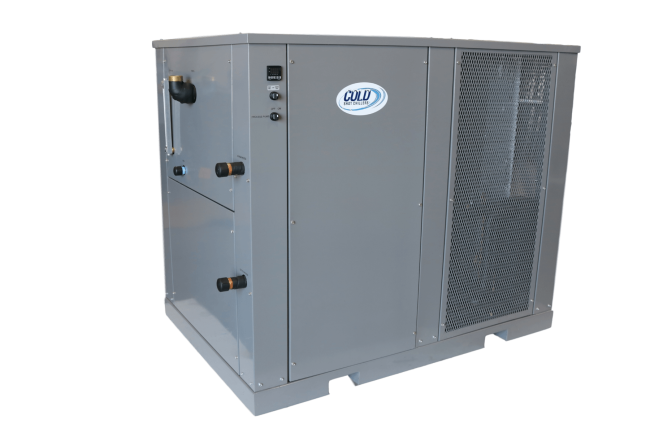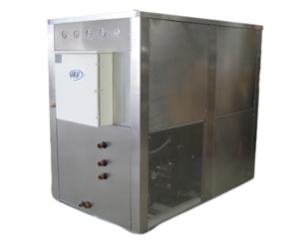
THE ULTIMATE GUIDE TO CHILLER SYSTEMS

Chiller systems are essential for maintaining low temperatures required in a wide range of residential, commercial, and industrial applications. Consequently, these systems account for a significant amount of the total energy consumption in North America. In this article, the chiller experts at Cold Shot Chillers will explore the general working principle of a chiller system, some common categories, and critical tips for operating and maintaining them to ensure high-efficiency operations.
What is an Industrial Chiller?
Industrial chiller systems play an essential role in various heating, ventilation, and air conditioning (HVAC) systems. Therefore, they are frequently incorporated into a wide range of residential and commercial facilities, including sporting arenas, hotels, apartment blocks, restaurants, hospitals, industrial facilities, and manufacturing plants.
Two key functions of HVAC systems include building dehumidification and cooling. With chiller systems, engineers can meet industrial and commercial cooling requirements in various applications, including metal finishing, plastic processing, water cutting, medical manufacturing, food processing, residential, and welding. Generally, chillers meet these requirements by transferring heat from an internal environment to an external one with a heat transfer device and a refrigerant.
Due to their importance in HVAC systems, chillers account for over 50% of the total electricity consumption in seasonal periods, with an estimated 20% of the total electricity generated in North America.

How Do Chiller Systems Work?
Chiller systems provide continuous coolant flow to the cool side of a process water system at a conventional temperature of 10°C by leveraging the principle of vapor compression and absorption. Moreover, chiller systems pump coolant through specific industrial processes, resulting in heat extraction from relevant areas of the facility. The coolant then flows back to the return side of the process water system.
Chiller systems also contain a vapor compression mechanical refrigeration system which connects the process water system through an evaporator. This refrigeration system-based refrigerant circulates through other components of the chiller, including the evaporator, compressor, condenser, and expansion device. Each of these components thermodynamically ensures process cooling.
The evaporator, which functions as a heat exchanger, transfers the captured heat to the refrigerant. During heat transfer, the refrigerant evaporates as it changes from a low-pressure liquid into vapor, reducing the process temperature. The compressor performs multiple functions, including removing the refrigerant from the evaporator and ensuring a constantly low evaporator pressure for heat absorption at an appropriate rate.
Additionally, the compressor also raises the outgoing refrigerant vapor pressure to achieve a suitably high temperature for heat release in the condenser. Lastly, the condenser changes the refrigerant back to a liquid state.
Different Types of Industrial Chillers
Outlined below are four common categories of industrial chillers available for a wide range of residential, commercial, and industrial applications:
Air-Cooled vs. Water-Cooled
What’s the difference between air-cooled vs. water-cooled chillers? Firstly, chiller systems can use two different types of condensers: water-cooled and air-cooled.
Air-cooled condensers force air across refrigerant lines with the aid of a motorized blower. With a similar working principle as a car radiator, air-cooled chillers require an ambient temperature of at most 35°C to operate effectively.

Water-cooled condensers have a similar working principle as an air-cooled chiller. They achieve heat transfer using a two-step process:
- Transfer of heat from the refrigerant vapor to the condenser water
- Discharge of heat from the condenser water to the atmosphere at the cooling tower

Portable vs. Central
Portable chillers with capacities ranging from 30-40 tons exhibit simple designs and low installation costs. On the other hand, central chillers have much larger capacities, come in complicated designs, offer higher efficiencies, and correspondingly higher installation costs.
Some key benefits of portable chillers include easy transportation, simple connection capabilities, and ease of powering. Conversely, central chillers can cool multiple large and variable process loads simultaneously at similar temperatures.
Common Chiller Applications
There are various applications for chiller systems in residential, commercial, and industrial sectors. These systems are essential in ensuring adequate temperature levels that are required in the following:
- Industrial Welding
- HVAC Systems
- Hydroscopic Cooling
- Residential Cooling
- Injection Molding
Chiller Operation and Maintenance Tips
To no one’s surprise, chiller system costs can take up a massive chunk of your building’s utility bills. Fortunately, there are specific measures you can take to maximize your chiller’s efficiency and therefore save on energy costs. Some common tips for operating and maintaining industrial chillers include:
- Maintaining daily logs that can aid in the easy and rapid prediction of future damage to the chiller system
- Regular cleaning of the chiller tubing
- Periodic inspection of condenser water loops to minimize biological growth, corrosion, and material scaling
- Mitigate refrigerant leakages
- Regular measurement of glycol concentration to avoid ice-related blockages and tube rupturing
- Maintain an optimal chilled water flow rate to provide efficient heat exchange
- Prevention of the inflow of air and moisture into the chiller system
- Constant inspection of motor and starting mechanisms
- Installation of variable speed drives

Implementing these best practices will significantly impact your chiller operational efficiency and building operating costs. Predictive maintenance and optimization of your chiller system will ultimately minimize downtime and maximize productivity. Check out our industrial chiller maintenance checklist for more tips.
More Questions about Chillers? Ask an Expert!
Cold Shot Chillers is an industrial chiller manufacturer dedicated to building and installing high-quality chillers that meet global industry standards. Our cost-effective and dependable chillers are designed to maintain the ideal temperature for all your industrial needs.
Contact our team today for more questions about chiller systems and other cooling solutions.